IFRS: Advantages and Disadvantages for Investors Analysis
VerifiedAdded on 2021/05/27
|8
|1122
|48
Report
AI Summary
This report provides an overview of the pros and cons of International Financial Reporting Standards (IFRS) for investors. It discusses the benefits of IFRS, such as the development of high-quality standards and the adoption by many countries. It also examines the limitations, including issues related to fair value accounting and the varying opinions on uniform accounting rules. The report highlights the practical implications of IFRS, particularly in the context of globalization and the need for consistent accounting practices. It references the impact of political and economic factors and discusses the significance of fair value accounting. The report concludes by emphasizing that the adoption of IFRS is an economic and political experiment that has significant implications for investors, with an overall assessment of the advantages and disadvantages of IFRS from the perspective of the investors.

International Financial
Reporting Standards-
PROS AND CONS FOR
INVESTORS
Reporting Standards-
PROS AND CONS FOR
INVESTORS
Paraphrase This Document
Need a fresh take? Get an instant paraphrase of this document with our AI Paraphraser
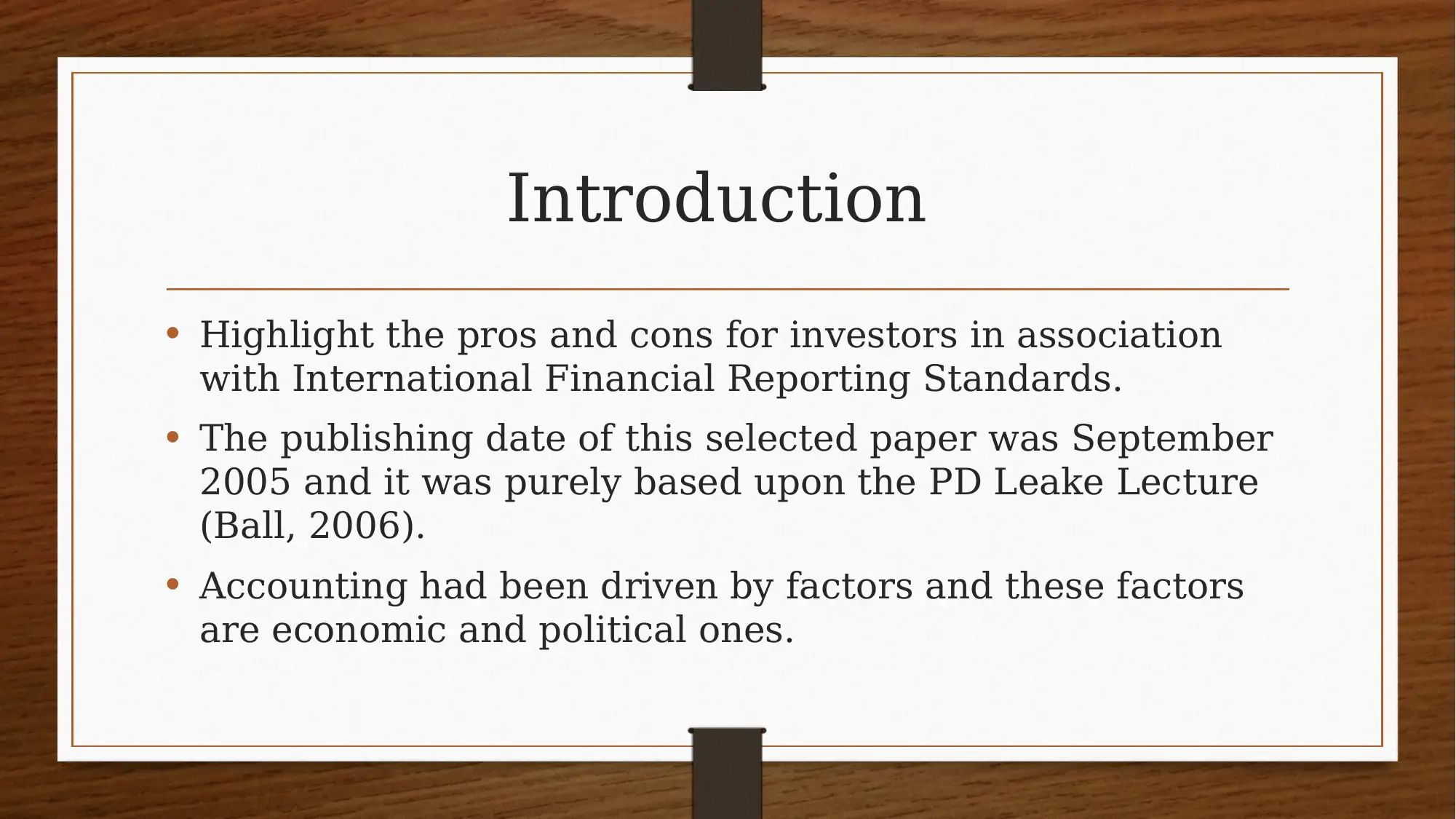
Introduction
• Highlight the pros and cons for investors in association
with International Financial Reporting Standards.
• The publishing date of this selected paper was September
2005 and it was purely based upon the PD Leake Lecture
(Ball, 2006).
• Accounting had been driven by factors and these factors
are economic and political ones.
• Highlight the pros and cons for investors in association
with International Financial Reporting Standards.
• The publishing date of this selected paper was September
2005 and it was purely based upon the PD Leake Lecture
(Ball, 2006).
• Accounting had been driven by factors and these factors
are economic and political ones.
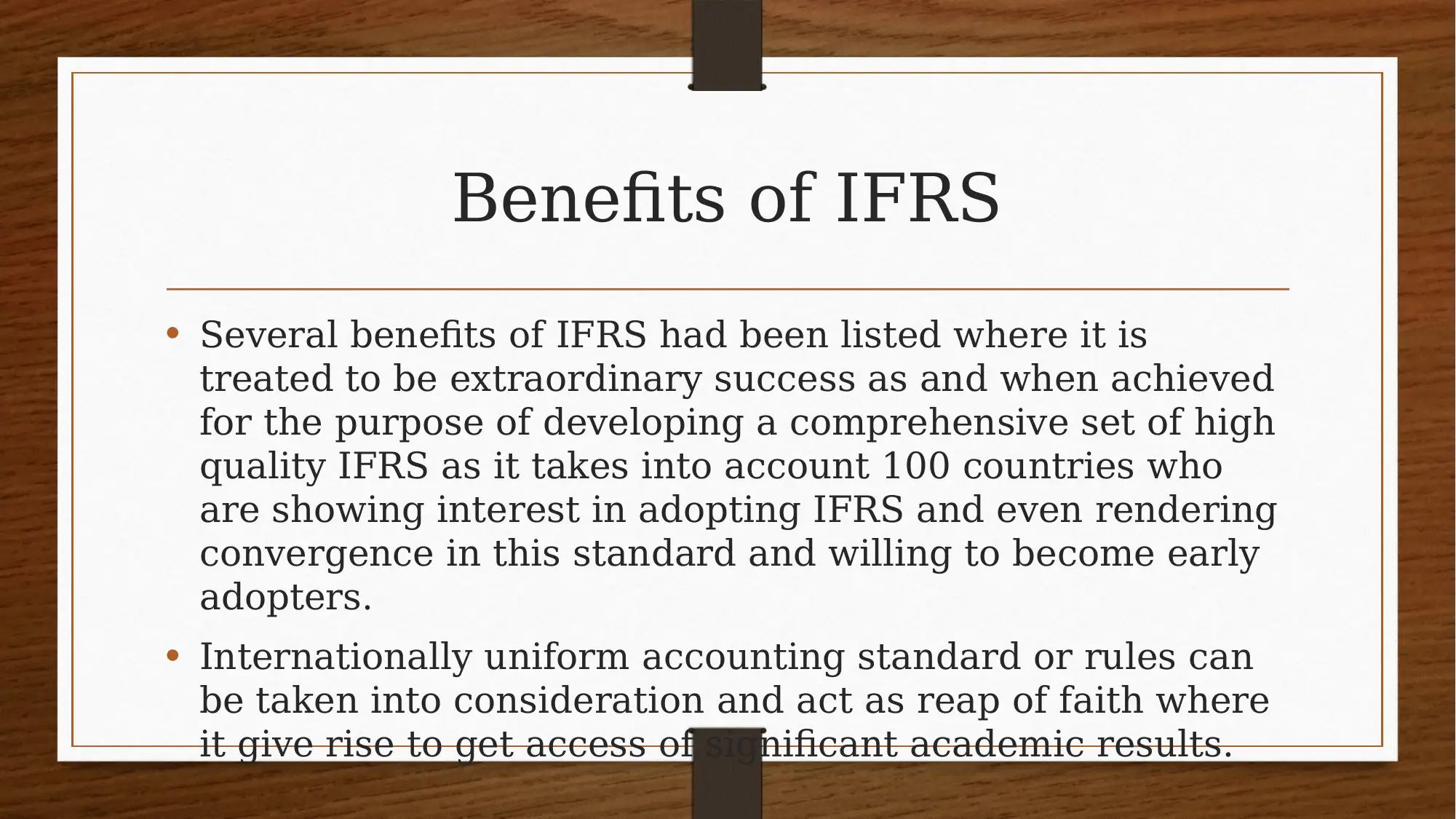
Benefits of IFRS
• Several benefits of IFRS had been listed where it is
treated to be extraordinary success as and when achieved
for the purpose of developing a comprehensive set of high
quality IFRS as it takes into account 100 countries who
are showing interest in adopting IFRS and even rendering
convergence in this standard and willing to become early
adopters.
• Internationally uniform accounting standard or rules can
be taken into consideration and act as reap of faith where
it give rise to get access of significant academic results.
• Several benefits of IFRS had been listed where it is
treated to be extraordinary success as and when achieved
for the purpose of developing a comprehensive set of high
quality IFRS as it takes into account 100 countries who
are showing interest in adopting IFRS and even rendering
convergence in this standard and willing to become early
adopters.
• Internationally uniform accounting standard or rules can
be taken into consideration and act as reap of faith where
it give rise to get access of significant academic results.
⊘ This is a preview!⊘
Do you want full access?
Subscribe today to unlock all pages.

Trusted by 1+ million students worldwide
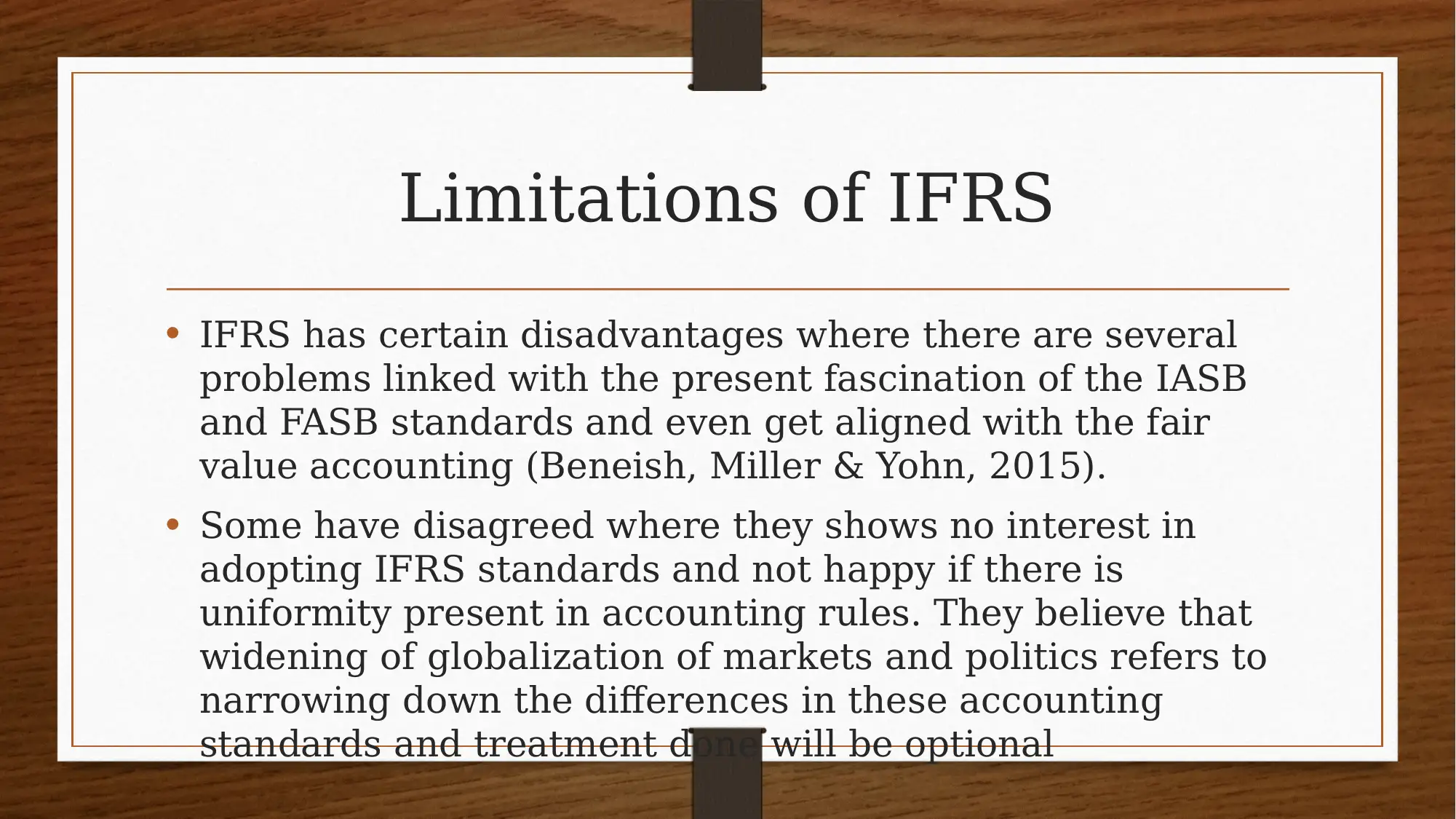
Limitations of IFRS
• IFRS has certain disadvantages where there are several
problems linked with the present fascination of the IASB
and FASB standards and even get aligned with the fair
value accounting (Beneish, Miller & Yohn, 2015).
• Some have disagreed where they shows no interest in
adopting IFRS standards and not happy if there is
uniformity present in accounting rules. They believe that
widening of globalization of markets and politics refers to
narrowing down the differences in these accounting
standards and treatment done will be optional
• IFRS has certain disadvantages where there are several
problems linked with the present fascination of the IASB
and FASB standards and even get aligned with the fair
value accounting (Beneish, Miller & Yohn, 2015).
• Some have disagreed where they shows no interest in
adopting IFRS standards and not happy if there is
uniformity present in accounting rules. They believe that
widening of globalization of markets and politics refers to
narrowing down the differences in these accounting
standards and treatment done will be optional
Paraphrase This Document
Need a fresh take? Get an instant paraphrase of this document with our AI Paraphraser
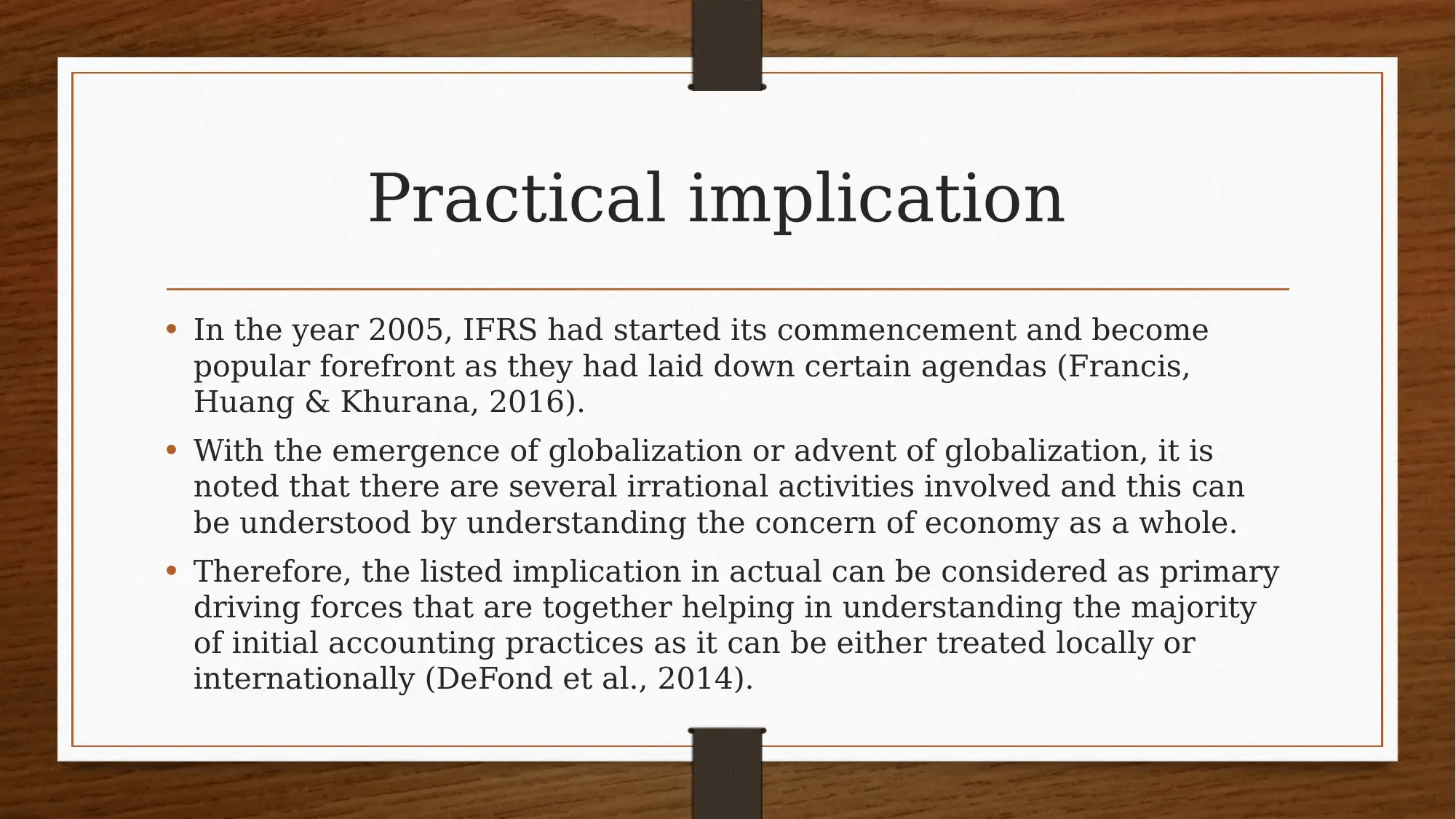
Practical implication
• In the year 2005, IFRS had started its commencement and become
popular forefront as they had laid down certain agendas (Francis,
Huang & Khurana, 2016).
• With the emergence of globalization or advent of globalization, it is
noted that there are several irrational activities involved and this can
be understood by understanding the concern of economy as a whole.
• Therefore, the listed implication in actual can be considered as primary
driving forces that are together helping in understanding the majority
of initial accounting practices as it can be either treated locally or
internationally (DeFond et al., 2014).
• In the year 2005, IFRS had started its commencement and become
popular forefront as they had laid down certain agendas (Francis,
Huang & Khurana, 2016).
• With the emergence of globalization or advent of globalization, it is
noted that there are several irrational activities involved and this can
be understood by understanding the concern of economy as a whole.
• Therefore, the listed implication in actual can be considered as primary
driving forces that are together helping in understanding the majority
of initial accounting practices as it can be either treated locally or
internationally (DeFond et al., 2014).
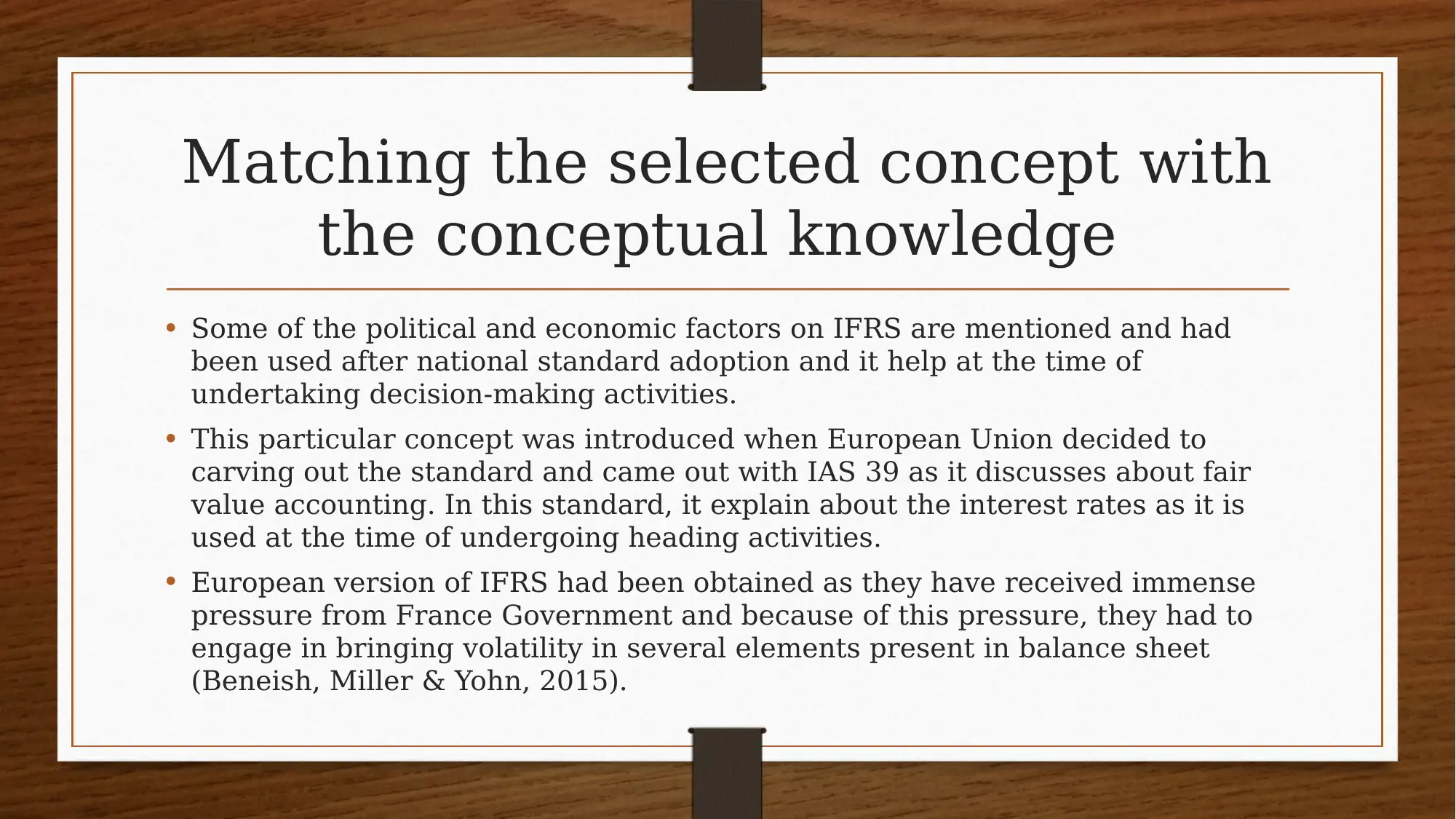
Matching the selected concept with
the conceptual knowledge
• Some of the political and economic factors on IFRS are mentioned and had
been used after national standard adoption and it help at the time of
undertaking decision-making activities.
• This particular concept was introduced when European Union decided to
carving out the standard and came out with IAS 39 as it discusses about fair
value accounting. In this standard, it explain about the interest rates as it is
used at the time of undergoing heading activities.
• European version of IFRS had been obtained as they have received immense
pressure from France Government and because of this pressure, they had to
engage in bringing volatility in several elements present in balance sheet
(Beneish, Miller & Yohn, 2015).
the conceptual knowledge
• Some of the political and economic factors on IFRS are mentioned and had
been used after national standard adoption and it help at the time of
undertaking decision-making activities.
• This particular concept was introduced when European Union decided to
carving out the standard and came out with IAS 39 as it discusses about fair
value accounting. In this standard, it explain about the interest rates as it is
used at the time of undergoing heading activities.
• European version of IFRS had been obtained as they have received immense
pressure from France Government and because of this pressure, they had to
engage in bringing volatility in several elements present in balance sheet
(Beneish, Miller & Yohn, 2015).
⊘ This is a preview!⊘
Do you want full access?
Subscribe today to unlock all pages.

Trusted by 1+ million students worldwide
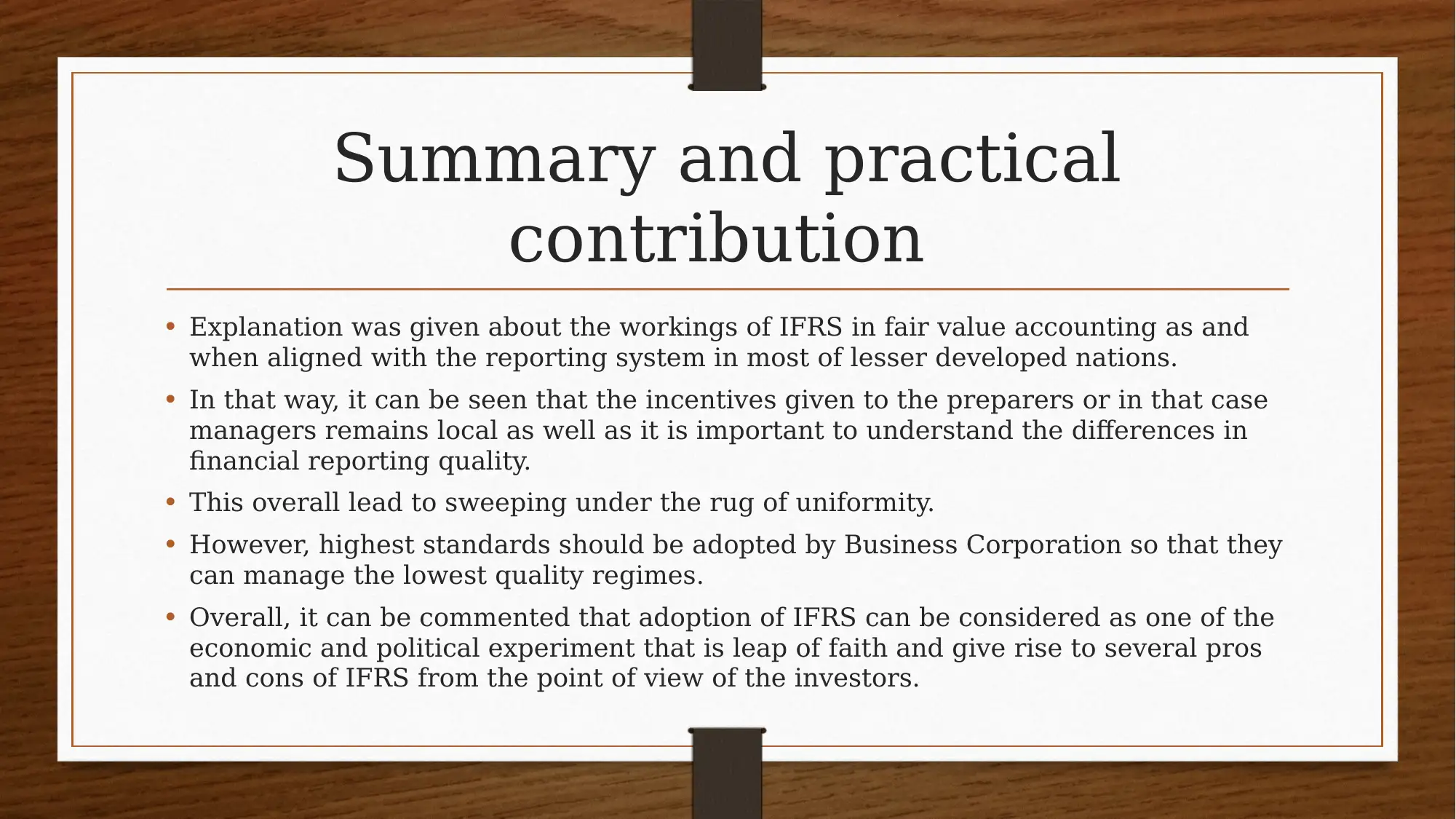
Summary and practical
contribution
• Explanation was given about the workings of IFRS in fair value accounting as and
when aligned with the reporting system in most of lesser developed nations.
• In that way, it can be seen that the incentives given to the preparers or in that case
managers remains local as well as it is important to understand the differences in
financial reporting quality.
• This overall lead to sweeping under the rug of uniformity.
• However, highest standards should be adopted by Business Corporation so that they
can manage the lowest quality regimes.
• Overall, it can be commented that adoption of IFRS can be considered as one of the
economic and political experiment that is leap of faith and give rise to several pros
and cons of IFRS from the point of view of the investors.
contribution
• Explanation was given about the workings of IFRS in fair value accounting as and
when aligned with the reporting system in most of lesser developed nations.
• In that way, it can be seen that the incentives given to the preparers or in that case
managers remains local as well as it is important to understand the differences in
financial reporting quality.
• This overall lead to sweeping under the rug of uniformity.
• However, highest standards should be adopted by Business Corporation so that they
can manage the lowest quality regimes.
• Overall, it can be commented that adoption of IFRS can be considered as one of the
economic and political experiment that is leap of faith and give rise to several pros
and cons of IFRS from the point of view of the investors.
Paraphrase This Document
Need a fresh take? Get an instant paraphrase of this document with our AI Paraphraser
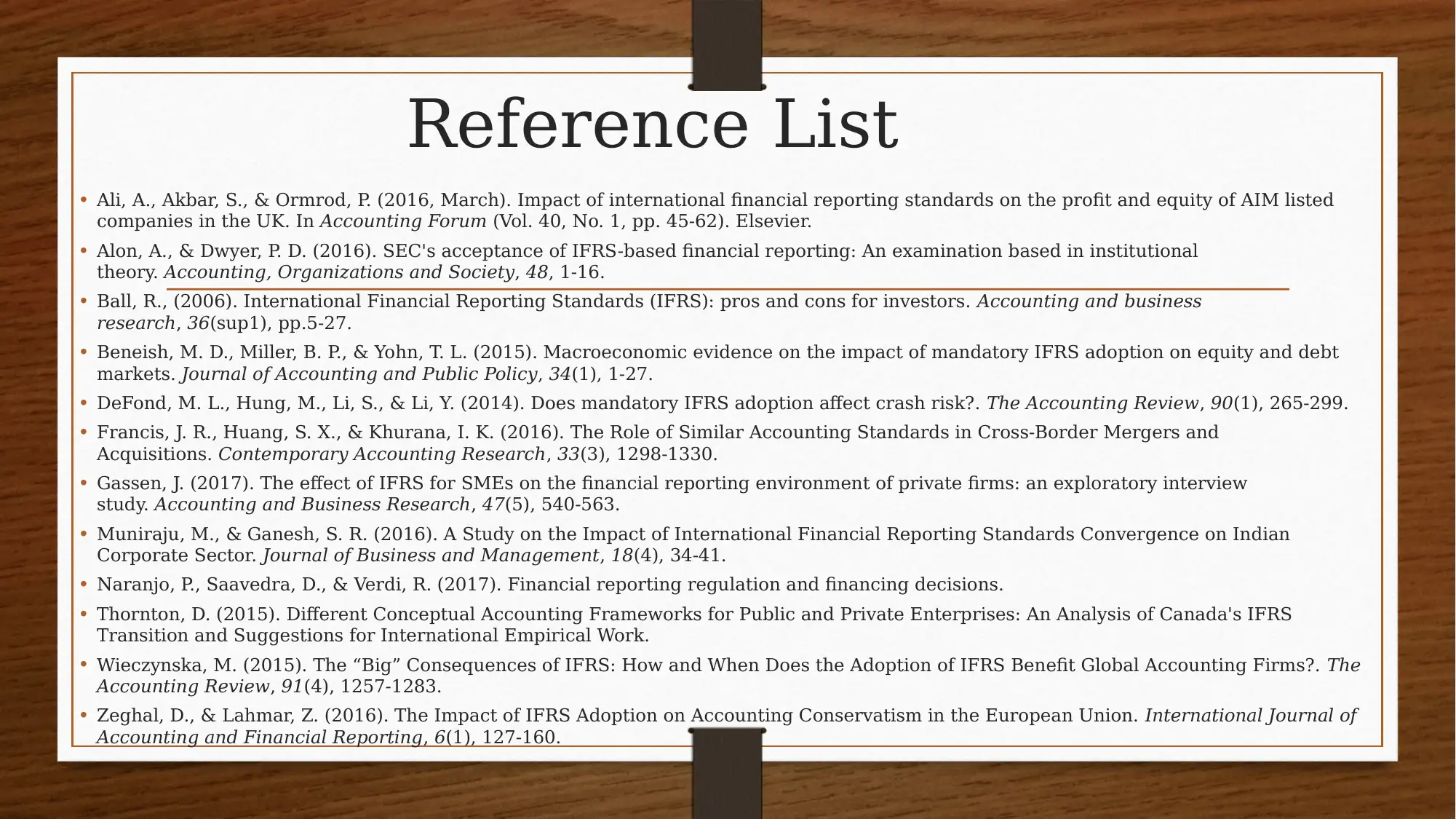
Reference List
• Ali, A., Akbar, S., & Ormrod, P. (2016, March). Impact of international financial reporting standards on the profit and equity of AIM listed
companies in the UK. In Accounting Forum (Vol. 40, No. 1, pp. 45-62). Elsevier.
• Alon, A., & Dwyer, P. D. (2016). SEC's acceptance of IFRS-based financial reporting: An examination based in institutional
theory. Accounting, Organizations and Society, 48, 1-16.
• Ball, R., (2006). International Financial Reporting Standards (IFRS): pros and cons for investors. Accounting and business
research, 36(sup1), pp.5-27.
• Beneish, M. D., Miller, B. P., & Yohn, T. L. (2015). Macroeconomic evidence on the impact of mandatory IFRS adoption on equity and debt
markets. Journal of Accounting and Public Policy, 34(1), 1-27.
• DeFond, M. L., Hung, M., Li, S., & Li, Y. (2014). Does mandatory IFRS adoption affect crash risk?. The Accounting Review, 90(1), 265-299.
• Francis, J. R., Huang, S. X., & Khurana, I. K. (2016). The Role of Similar Accounting Standards in Cross‐Border Mergers and
Acquisitions. Contemporary Accounting Research, 33(3), 1298-1330.
• Gassen, J. (2017). The effect of IFRS for SMEs on the financial reporting environment of private firms: an exploratory interview
study. Accounting and Business Research, 47(5), 540-563.
• Muniraju, M., & Ganesh, S. R. (2016). A Study on the Impact of International Financial Reporting Standards Convergence on Indian
Corporate Sector. Journal of Business and Management, 18(4), 34-41.
• Naranjo, P., Saavedra, D., & Verdi, R. (2017). Financial reporting regulation and financing decisions.
• Thornton, D. (2015). Different Conceptual Accounting Frameworks for Public and Private Enterprises: An Analysis of Canada's IFRS
Transition and Suggestions for International Empirical Work.
• Wieczynska, M. (2015). The “Big” Consequences of IFRS: How and When Does the Adoption of IFRS Benefit Global Accounting Firms?. The
Accounting Review, 91(4), 1257-1283.
• Zeghal, D., & Lahmar, Z. (2016). The Impact of IFRS Adoption on Accounting Conservatism in the European Union. International Journal of
Accounting and Financial Reporting, 6(1), 127-160.
• Ali, A., Akbar, S., & Ormrod, P. (2016, March). Impact of international financial reporting standards on the profit and equity of AIM listed
companies in the UK. In Accounting Forum (Vol. 40, No. 1, pp. 45-62). Elsevier.
• Alon, A., & Dwyer, P. D. (2016). SEC's acceptance of IFRS-based financial reporting: An examination based in institutional
theory. Accounting, Organizations and Society, 48, 1-16.
• Ball, R., (2006). International Financial Reporting Standards (IFRS): pros and cons for investors. Accounting and business
research, 36(sup1), pp.5-27.
• Beneish, M. D., Miller, B. P., & Yohn, T. L. (2015). Macroeconomic evidence on the impact of mandatory IFRS adoption on equity and debt
markets. Journal of Accounting and Public Policy, 34(1), 1-27.
• DeFond, M. L., Hung, M., Li, S., & Li, Y. (2014). Does mandatory IFRS adoption affect crash risk?. The Accounting Review, 90(1), 265-299.
• Francis, J. R., Huang, S. X., & Khurana, I. K. (2016). The Role of Similar Accounting Standards in Cross‐Border Mergers and
Acquisitions. Contemporary Accounting Research, 33(3), 1298-1330.
• Gassen, J. (2017). The effect of IFRS for SMEs on the financial reporting environment of private firms: an exploratory interview
study. Accounting and Business Research, 47(5), 540-563.
• Muniraju, M., & Ganesh, S. R. (2016). A Study on the Impact of International Financial Reporting Standards Convergence on Indian
Corporate Sector. Journal of Business and Management, 18(4), 34-41.
• Naranjo, P., Saavedra, D., & Verdi, R. (2017). Financial reporting regulation and financing decisions.
• Thornton, D. (2015). Different Conceptual Accounting Frameworks for Public and Private Enterprises: An Analysis of Canada's IFRS
Transition and Suggestions for International Empirical Work.
• Wieczynska, M. (2015). The “Big” Consequences of IFRS: How and When Does the Adoption of IFRS Benefit Global Accounting Firms?. The
Accounting Review, 91(4), 1257-1283.
• Zeghal, D., & Lahmar, Z. (2016). The Impact of IFRS Adoption on Accounting Conservatism in the European Union. International Journal of
Accounting and Financial Reporting, 6(1), 127-160.
1 out of 8
Related Documents
Your All-in-One AI-Powered Toolkit for Academic Success.
+13062052269
info@desklib.com
Available 24*7 on WhatsApp / Email
![[object Object]](/_next/static/media/star-bottom.7253800d.svg)
Unlock your academic potential
Copyright © 2020–2025 A2Z Services. All Rights Reserved. Developed and managed by ZUCOL.





